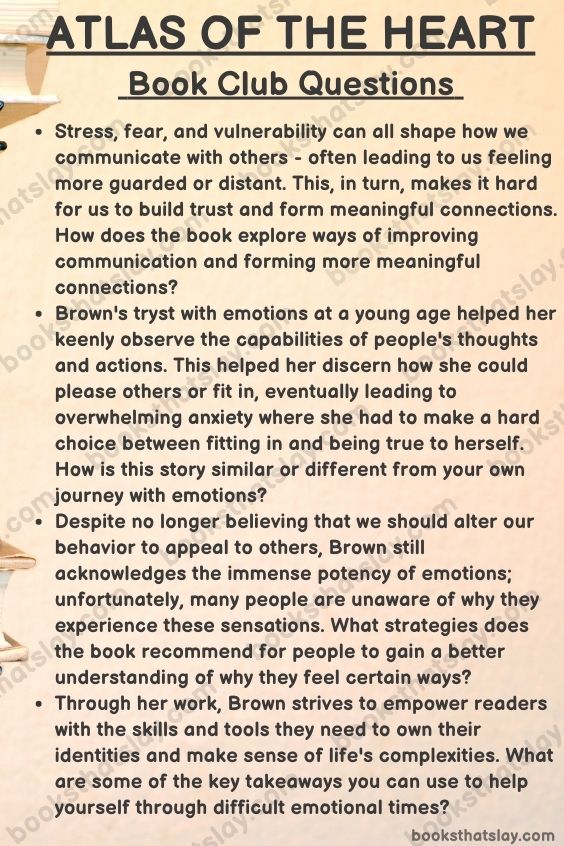15 Atlas of the Heart Book Club Questions
Brene Brown’s book, “Atlas of the Heart,” is your ultimate guide to exploring the eighty-seven emotions and experiences that make us who we are. With her unique storytelling skills and extensive research, Brown equips you with the tools to navigate this uncharted territory and connect with others on a deeper level.
Let’s explore the language of human experience together with these book club questions for Atlas of the Heart.
Not only are these questions going to help you further your understanding of Brown’s work, they’re also going to help you learn more about yourself and how you can better use emotions to make meaningful choices in your everyday life.
Let’s go.

Atlas of the Heart Book Club Questions
- Stress, fear, and vulnerability can all shape how we communicate with others – often leading to us feeling more guarded or distant. This, in turn, makes it hard for us to build trust and form meaningful connections. How does the book explore ways of improving communication and forming more meaningful connections?
- Brown’s tryst with emotions at a young age helped her keenly observe the capabilities of people’s thoughts and actions. This helped her discern how she could please others or fit in, eventually leading to overwhelming anxiety where she had to make a hard choice between fitting in and being true to herself. How is this story similar or different from your own journey with emotions?
- Despite no longer believing that we should alter our behavior to appeal to others, Brown still acknowledges the immense potency of emotions; unfortunately, many people are unaware of why they experience these sensations. What strategies does the book recommend for people to gain a better understanding of why they feel certain ways?
- Analyzing emotions can be extremely challenging, especially since many are so closely intertwined with each other. To help readers understand their feelings in more depth, Brown provides several exercises that allow for a deeper exploration. What do you think about these exercises, and how could they help you gain a better understanding of yourself?
- Through her work, Brown strives to empower readers with the skills and tools they need to own their identities and make sense of life’s complexities. What are some of the key takeaways you can use to help yourself through difficult emotional times?
- It’s natural to feel overwhelmed by emotions, but Brown offers a reminder that it is possible to rewire our brains and form healthier behavioral patterns. How does the book propose we do this, and how could this help us better understand and regulate our emotions?
- The majority of the book clubs focus on picking fiction books. Why do you think it’s important for book clubs also to pick non-fiction, especially works like Atlas of the Heart, that explore complex topics such as emotions?
- According to Brown, it is critical that we don’t let comparison destroy our connections with other people or the way we view ourselves. How does the book approach the concept of comparison in a more productive way?
- By stressing the significance of inquisitiveness and embracing our humanity, Brown suggests that it is more beneficial to be open-minded than to retreat or express anger when faced with challenging circumstances. Have you ever been in such a situation where you needed to practice openness? How did it help you navigate the situation better?
- From compassion to embarrassment, insecurity to betrayal – all of these emotions are indicative of our instinctive drive for meaningful relationships. How does this book offer advice for fostering more meaningful connections and relationships with others?
- Humans can be lonely but need to be accompanied in order to survive. Brown talks about how being in the company of others can offer us courage and strength. In what ways have you experienced this connection?
- After reading the book, do you feel that practicing tranquility and gratitude can help us better accept our own emotions and those of others? What are some ways these practices can be incorporated into our life?
- Going through emotions and going on this journey together requires trust, courage, and vulnerability – but it is, in fact, the foundation of our humanity. It might be hard work, yet what can’t be measured are its rewards as we discover a sense of connection with one another. Do you agree? How has your experience been so far, having gone through this journey on your own and with the help of Brown’s book?
- Brown says, “When we feel isolated, disconnected, and lonely, we try to protect ourselves. In that mode, we want to connect, but our brain is attempting to override connection with self-protection. That mean less empathy, more defensiveness, more numbing and less sleeping. Unchecked loneliness fuels continued loneliness by keeping us afraid to reach out.” This statement by Brown is an indication of the power loneliness has on us. What is your opinion? How can we use this knowledge to help ourselves during challenging times?
- What is your biggest takeaway from the book? Also, unlike other self-help books, this book was comparatively more visually appealing. How did this visual aspect of the book contribute to your liking of this book?
If you liked this set of questions, here are a few other options for you to explore.